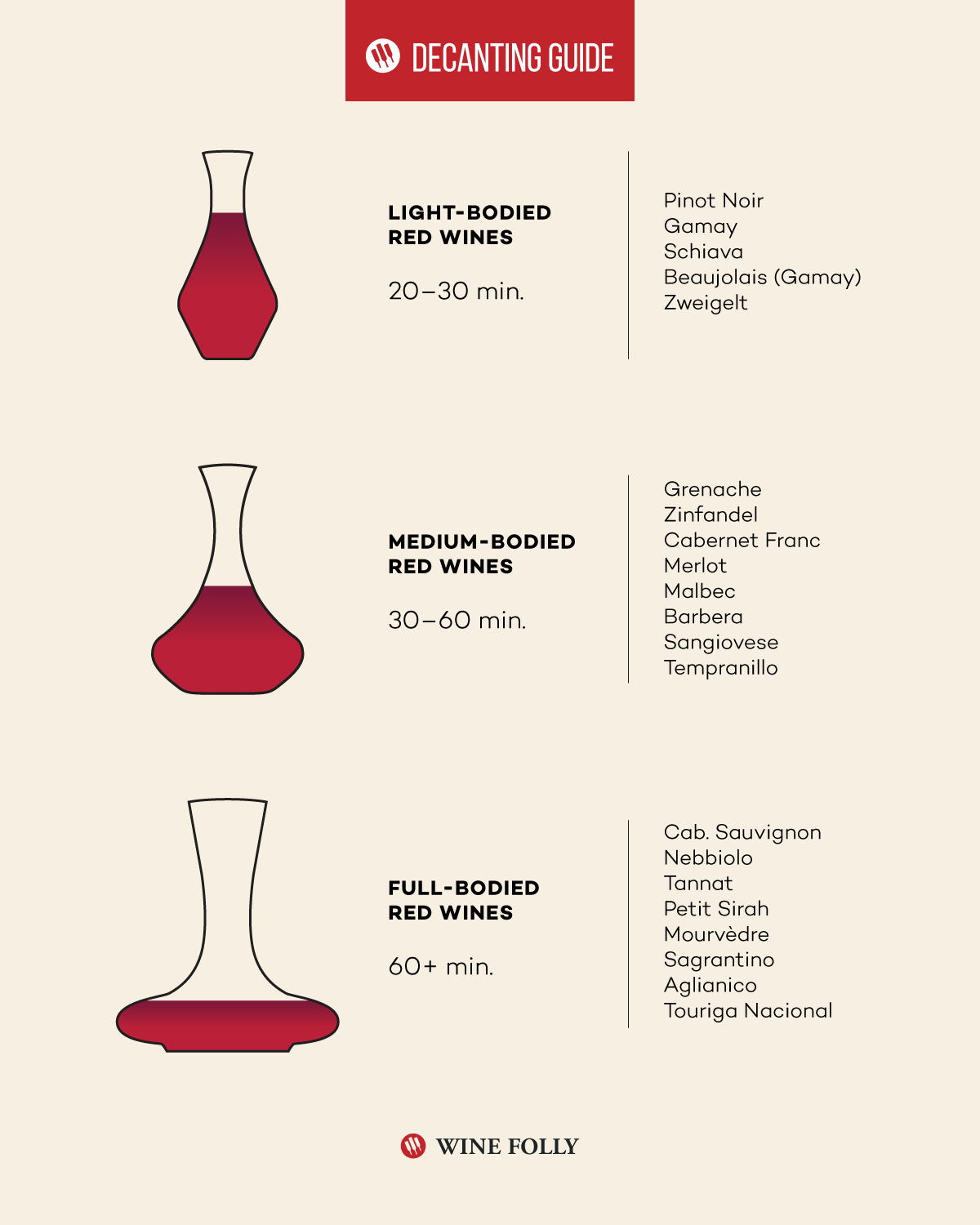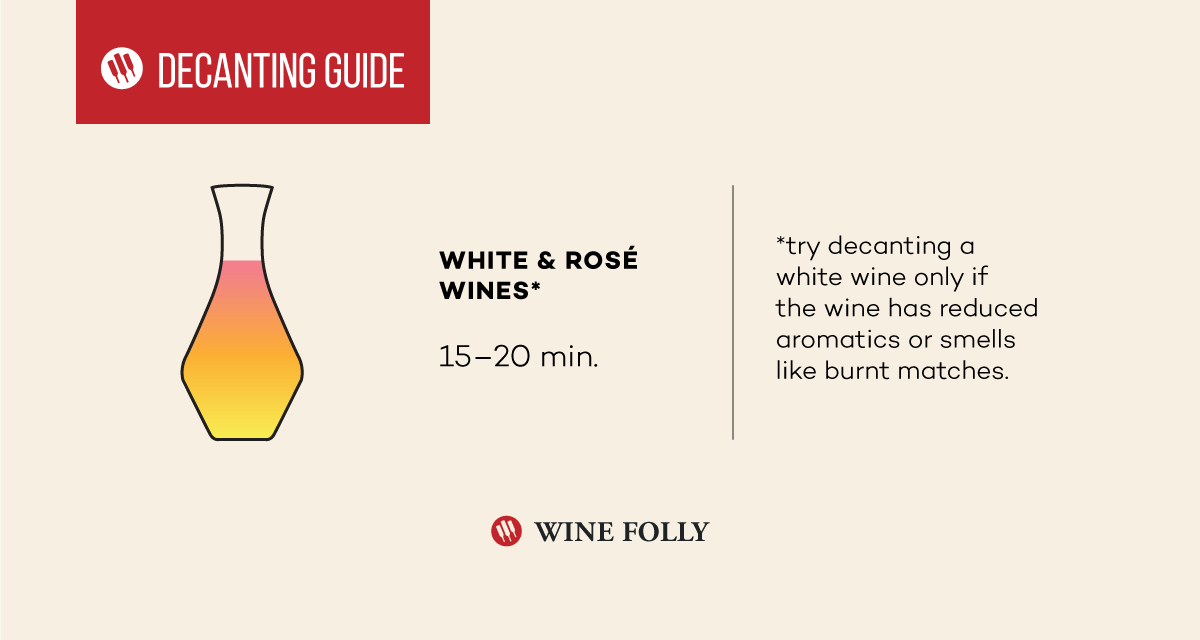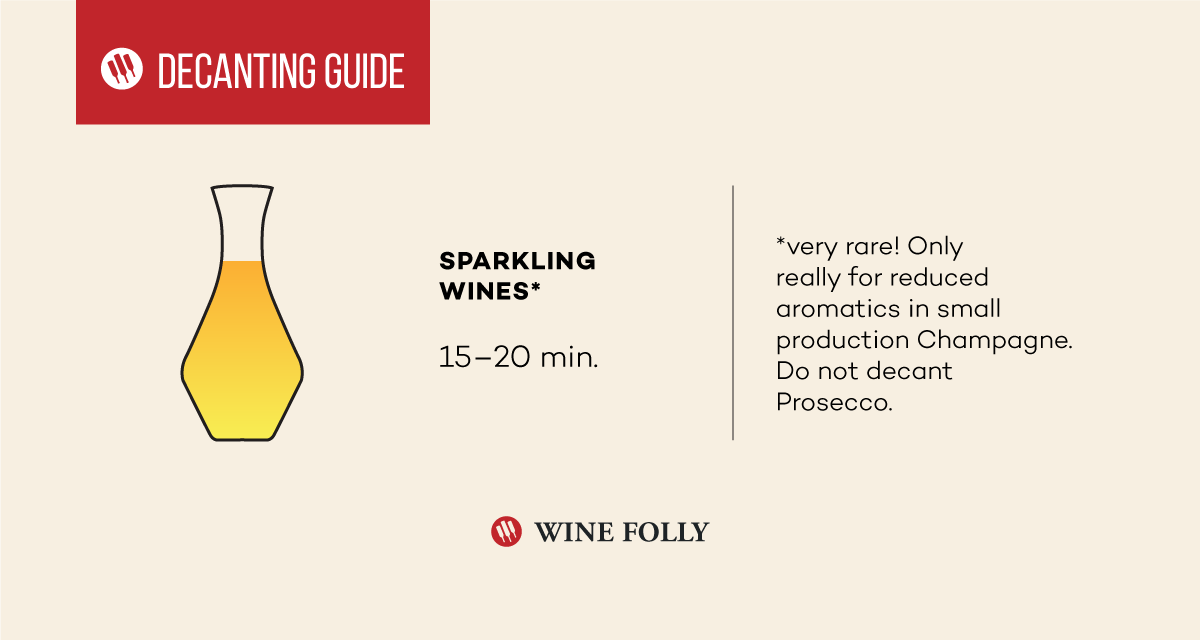The simple act of pouring wine and allowing it some “air time” actually improves the taste. But, how long should you wait?
And, does wine go bad if decanted too long?
So… how long does it take to decant wine?
- Red Wines – 20 minutes to 2 hours, depending on style.
- White and Rosé Wines – up to 30 minutes, based on conditions.
- Sparkling Wines – up to 30 minutes, based on certain conditions.
- Other styles – tips on natural wines, orange wines, and more.
Red Wines
Nearly all red wines benefit from decanting. There are two primary processes involved (oxidation and evaporation) that ultimately make red wines taste fruitier and smoother following decantation.
- Light-Bodied Red Wines: 20–30 minutes. Light-bodied red wines include Pinot Noir, Gamay (aka “Beaujolais”), Zweigelt, and Schiava.
- Medium-Bodied Red Wines: 30-60 minutes. A few examples include Cabernet Franc, Grenache, Merlot, Malbec, Barbera, Dolcetto, and Tempranillo.
- Full-Bodied Red Wines: 60 minutes or more. Examples include Cabernet Sauvignon, Nebbiolo, Petit Sirah, Monastrell (aka Mourvèdre), and Tannat.
At around 15–20 minutes, the reductive traits in red wines blow off. Reduction smells kind of like rotten eggs, old lunch meat, burnt rubber, or even hot farts! It’s pretty common in red wines, and happens when aromatic compounds manifest in an anaerobic environment (e.g. inside the bottle).
At around 30–45 minutes, the “burning” or “sharp” aromas in red wines are less detectable. You might think these burning smells are from alcohol, but more than likely, it’s volatile acidity (VA). Of course, every room and every taster senses VA a bit differently, so be sure to give your wines a sniff.
At around 60 minutes, tannins start to mellow out. Longer decanting times are usually reserved for bold red wines with very astringent-tasting tannins. While there isn’t a lot of science to back up this observation, some suspect that the increase of aromatic compounds might reduce our perception of tannins.
How Long is Too Long?
As long as you’re drinking your wines within a few of hours of being decanted you should be fine. Of course, there are a few special exceptions:
- Old Wines: Some old wines are very delicate and rapidly decay after being opened. Your best bet is to have “primer” wines at the ready if you’re planning a tasting featuring old wines. Or, contact the producer for a recommendation.
- White Wines: Delicate white wines with higher levels of thiols (smells like grapefruit, passionfruit, or guava) may lose their aromas if over-decanted. Read more on that below.
White and Rosé Wines
Up to 30 minutes if the wine shows signs of reduction.
Most white and rosé wines don’t need to be decanted. In fact, some aromatic compounds, like the passionfruit flavor in Sauvignon Blanc, waft away! So, the only reason you might want to decant a white or a rosé wine is if it’s “reduced.”
Reduction in white wine sometimes smells like burnt match, but most of the time it just lacks aromas. If you smell only “mineral-like” flavors and very few fruit smells, your white might have some reduction. No big deal!
In most cases, pouring the wine into a glass and waiting about 15 minutes fixes the issue. You should smell a lot more fruit aromas after you wait!
Sparkling Wines
There are a few rare cases when you can decant sparkling wines. We’re talking rare!
Some grower Champagne and small-production Champagne wines have reduction (burnt match smell) and improve with decanting. Generally speaking, a sparkling wine decanter has much less surface area and is “amphora” shaped in order to preserve bubble finesse.
Other Wines
There are a few other fun scenarios when you can use your decanter!
- Orange Wines: Orange wines are *essentially* white wines made with skin contact. These wines have tannins and can benefit from some decanting. Try 15–30 minutes.
- Natural Wines: Natural and biodynamic wines often have reduction! (Burnt-match / fart smell). While we’re not exactly sure why, some believe this is caused by improper nitrogen balance in the vineyard soils. No problem – just decant for about 20 minutes. If you still get garlic odors, then you’ve got a real wine fault on your hands.
- Very Old Wines: As we mentioned earlier, old wines are pretty sensitive. Be sure to taste the wine when you open it to see if it tastes balanced. If so, cork it until your tasting. If not, test it periodically over 30 minutes to see if it improves and follow the recommendations above.


